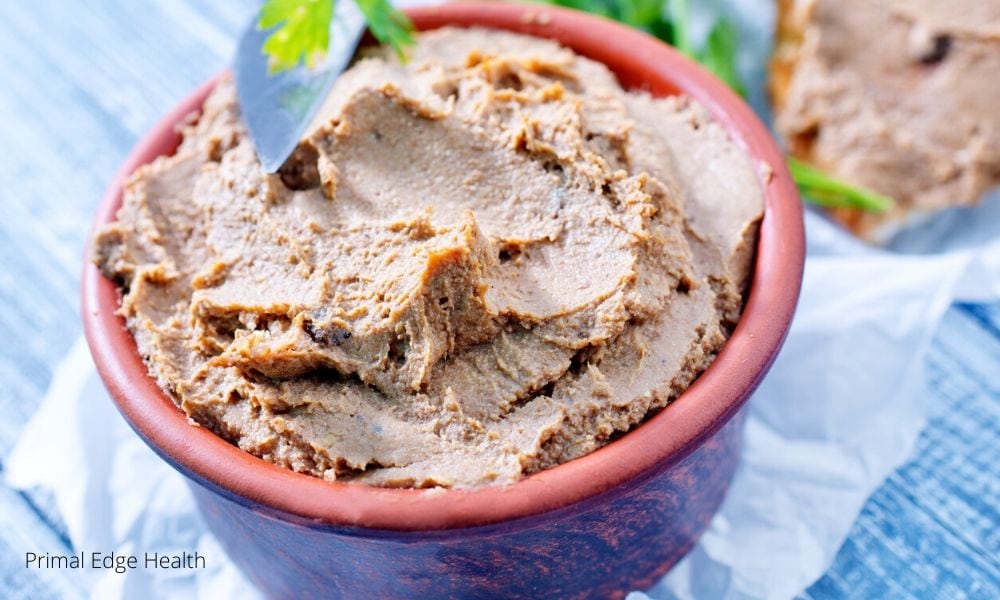How Organ Meat for Dogs Can Lead to a Happier, Healthier Pup
Primal Edge Health participates in the Amazon Services LLC Associates Program and other affiliate programs and therefore, may collect a share of sales or other compensation from the links on this page. This comes at no additional cost to you, and all the prices and availability are accurate at the time of publishing.
What are the benefits of organ meat for dogs? Like humans, man’s best friend can get plenty of nutritional benefits from liver, kidney, heart, and more.

I never thought to diversify my dog’s diet with organ meats until I discovered their benefits for humans. Incorporating nose-to-tail eating habits did wonders for my personal health, so I wondered if it could offer the same benefits for pets. Plus, he seemed so interested while I was cooking organ meat pie that I contacted my vet friend to ask about specific quantities before I let him try anything new.
I started introducing these cuts to my pup soon after and haven’t looked back. When his fur got shinier, and his diarrhea flare-ups became a thing of the past, I was hooked. Better yet, I like saving money with a more affordable food option.
Do you want to introduce your dog to this natural food? Here are some things you should know first.
Table of Contents (click to view)
Can Dogs Eat Organ Meat?
Organ meat can be very beneficial to the human diet, but is the same true for our furry friends? The K9 Magazine says yes, dogs can eat organ meat, and it can be very beneficial for their health.
Organ meats, such as liver, heart, and kidneys, are rich in essential nutrients that support various bodily functions. For example, liver is an excellent source of vitamin A, iron, and B vitamins, which are crucial for immune function, red blood cell production, and overall vitality.
What organ meats can your furry best friend eat? According to Veterinarian Dr. Jodie Gruenstern from the Animal Wellness Magazine, dogs and cats can eat the following organs:
- Liver
- Kidney
- Heart
- Stomach (tripe)
- Beef tongue
- Brain
- Ovaries, testicles, uterus
- Spleen
- Pancreas
- Beef lungs
- Gizzards
However, while organ meats are beneficial, they should be fed in moderation. For instance, too much liver may lead to vitamin A toxicity. It’s also important to buy organ meats that come from healthy, well-raised animals to avoid potential contamination or health risks.

The Benefits of Organ Meat for Dogs
Organ meats, such as liver, heart, and kidneys, offer a range of health benefits for dogs. Here are some key advantages:
Nutrient-Rich Food
Organ meats like chicken or beef liver, heart, and kidneys are loaded with essential vitamins and minerals. Liver, for instance, is packed with vitamin A, vitamin D, iron, B vitamins, and essential fatty acids.
According to the vets at DogCancer.com, these nutrients boost your dog’s immune system, help produce red blood cells, and keep them full of energy and vitality. Other important nutrients your dog can get from organ meats include:
- Calcium
- Folate
- Phosphorus
- Zinc
- Copper
- Selenium
- Iodine
- Manganese
Protein Boost
Organ meats provide high-quality protein, which is crucial for your dog’s muscle development and repair. Plus, it helps maintain a healthy, shiny coat that will make your pup look and feel great.
Before I discovered the benefits of organ meat for dogs, my pup was a kibble fan through and through. When I started adding bits of beef kidney and liver to his food, there was a noticeable difference in his fur’s softness in just a few weeks.
Happy Tummies
According to K9 Magazine, the enzymes in organ meats can do wonders for your dog’s digestion. They help break down food more efficiently, leading to better nutrient absorption and overall gut health.
A healthy tummy means a happier, more comfortable dog. It can also help prevent issues like constipation, diarrhea, and excessive flatulence, which also means less icky experiences for you.
Heart Health
Beef heart is rich in taurine, an amino acid that’s essential for cardiovascular health, says Animal Wellness Magazine. This is especially important for certain dog breeds that are prone to taurine deficiency, including:
- Cocker Spaniels
- Golden Retrievers
- Labrador Retrievers
- Newfoundlands
- Dalmatians
- Portuguese Water Dogs
- English Bulldogs
Energy Surge
Thanks to their nutrient density, organ meats can give your dog a significant energy boost. These superfoods are packed with essential nutrients that help maintain your dog’s energy levels throughout the day. This means your pup will have more stamina for playtime, longer walks, and all their favorite activities.
Interestingly, the same effect can be observed in humans. Consuming organ meats can also provide a natural energy boost for people due to their rich nutrient profile, explains Dr. Will Cole. High in vitamins, minerals, and protein, organ meats can help sustain energy levels, making you feel more vibrant and capable of tackling daily tasks.
Joint and Bone Support
Organ meats contain glucosamine and chondroitin, which are great for joint health, according to Vetericyn Animal Wellness. These nutrients can help support healthy joints and may even alleviate symptoms of arthritis and other joint issues to keep your dog moving comfortably.

Should Your Dog Eat Raw Organ Meat?
A common question among pet owners is if they should feed raw foods to their pets, including organ meat. With the raw feeding trend on the rise, it’s important to address this question head-on.
Dog Food Adviser says that raw organ meats are packed with essential vitamins and minerals in their most natural state, which means your dog can benefit from higher nutrient absorption. Additionally, they contain natural enzymes that aid in digestion, making it easier for your dog to break down and absorb nutrients.
However, there are also significant risks to consider. Raw organ meats can harbor harmful bacteria such as Salmonella and E. coli, posing health risks to both your dog and humans handling the meat. There’s also the risk of parasites, which can cause health issues if not properly handled or sourced from reputable suppliers.
My recommendation? Consult your vet if raw organ meat is a good idea for your pup. Keep in mind that not all dogs will tolerate raw meat well, and you must make sure they don’t have any underlying conditions that might contraindicate raw organ meat (or organ meat itself).
Tips for Serving Organ Meat to Your Pup
Once you have the green light from your vet, it’s time to introduce organ meat to your dog. Here are some helpful tips to make sure your pup gets the most out of this superfood:
- Start Slowly: Introduce organ meats gradually into your dog’s diet. Start with small portions to see how your dog reacts and to prevent any digestive upset. I recommend using these grass-fed beef liver chips as organ meat treats to start. If your dog is super picky, start with bone broth for dogs; it can be easier to digest and doesn’t taste too strong.
- Balance the Diet: Organ meats should be part of a balanced diet. Combine them with muscle meats, bones, and other essential nutrients to ensure your dog is getting a well-rounded meal. Take their metabolism into account as well and adjust the quantity accordingly.
- Moderation is Key: While organ meats are nutrient-dense, too much may be detrimental. Aim for organ meats to make up up to 10% of your dog’s total diet, says Dr. Amanda Charles. They should be a supplement, not the main meal.
- Variety Matters: Offer a variety of organ meats such as liver, heart, and kidneys to provide a broad spectrum of nutrients. Each type of organ meat offers different benefits. You can also try mixing your dog’s regular food with bone broth for dogs as a healthy topper.
- Source Quality: Always buy organ meats from reputable suppliers to make sure they are free from harmful bacteria, parasites, hormones, and other toxins. Organic and grass-fed options are usually the best.
- Serve Raw or Lightly Cooked: Raw organ meats retain the most nutrients, but if you prefer to cook organ meat, do so lightly to preserve their nutritional value. Avoid overcooking, which can destroy important vitamins and minerals.
- Proper Storage: Store offal in the freezer if you’re not using them immediately. Thaw them in the refrigerator and use them within a few days to ensure freshness.
- Handling Hygiene: Practice good hygiene when handling raw organ meats. Wash your hands and any surfaces thoroughly to prevent the spread of bacteria.
- Observe and Adjust: Monitor your dog’s health and behavior after introducing organ meats. If you notice any adverse reactions, adjust the portion sizes or frequency accordingly.
Help Your Pup Thrive With Organ Meat
Organ meat can offer a lot of benefits for your dog, such as more energy, a shinier coat, and fewer digestive issues. Still, a responsible owner should do their due diligence before introducing any kind of meat to their pet, so be sure to pay the vet a visit first!








Thank you for this article. Has anyone converted your slow cooker recipes to the instant pot? My offal stew was ruined by my attempt in the instant pot.
Yikes! I’m so sorry to hear that, Elaine. Unfortunately, no one has converted the slow cooker recipes to an instant pot method. Perhaps a band-aid approach would be to use the “slow cook” function on the IP instead of the pressure cook option. If I can get help with this project, I will be sure to jump at the opportunity! Thanks for the suggestion.